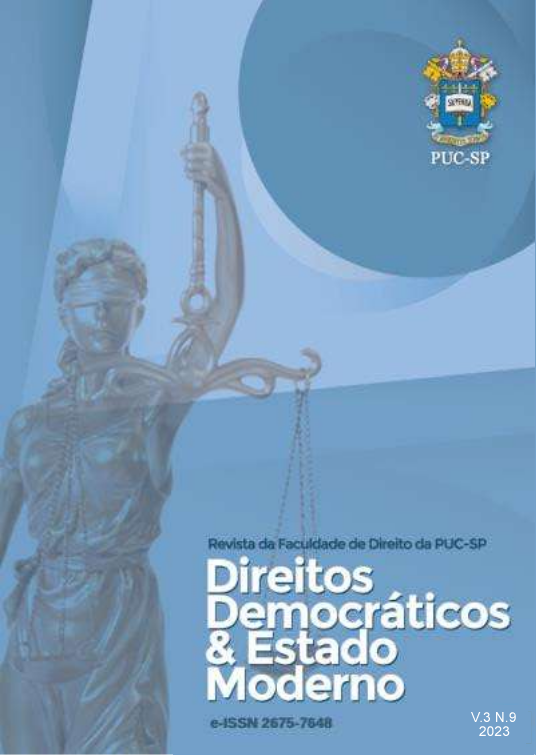O Estado de direito para quem?
O fim da retórica do direito liberdade e desigualdade
DOI:
https://doi.org/10.23925/ddem.v.3.n.9.62478Palavras-chave:
Democracia, Estado de Democrático de Direito, Razão Comunicativa, Dignidade HumanaResumo
O presente artigo pretendendo fazer uma releitura dos pressupostos de validade do direito toma como campo de pesquisa o mundo da vida interpretado como esfera dos discursos, dos diálogos interpelativos, e do próprio exercício democrático. Dado às realidades dispares situadas no mundo da vida, questiona-se a própria validade do direito quando temas ligados aos direitos fundamentais do homem, sua dignidade e reconhecimento e, a compreensão do Estado Democrático de Direito se contradizem ante realidades que ainda apontam pessoas, grupos, e etnias esquecidas à margem da sociedade. A insuficiência em termos de abastecimento soma-se à insuficiência em termos de segurança e a uma profusão de riscos ainda presentes na sociedade. Nesse ínterim, surgem custos sociais que parecem exigir demais da capacidade de integração de uma sociedade liberal. São indubitáveis indicadores que mensuram o grau de pobreza que se alastra nos países subdesenvolvidos, bem como em alguns países da Europa, o grau de insegurança social que se instala entre as classes sociais, refletem o crescimento de disparidades salariais que evidenciam o colapso da desintegração social instaurada nos países latinos.
Referências
BECK, Ulrich. Sociedade de risco: Rumo a uma outra modernidade. Trad. Sebastião do Nascimento. São Paulo: Editora 34. 2010.
CHAMON J. Lúcio Antonio. Filosofia do direito na alta modernidade: Incursões teóricas em Kelsen, Luhmann e Habermas. Rio de Janeiro: Lúmen Júris, 2005.
DURÃO, Aylton Barbieri. A tensão interna entre facticidade e validade no direito segundo Habermas. (Org), MARTINS, Clélia Aparecida, e POKER, José Geraldo. O pensamento de Habermas em questão. Marília: Oficina Universitária Unesp, 2008.
HABERMAS, Jürgen. Teoría de La acción comunicativa. Racionalidad de La acción y racionalización social. T. I. 2010.
HABERMAS, Jürgen. Direito e Democracia: Entre facticidade e Validade. I. 2ª Ed. Trad. Flávio Beno Siebeneichler. Rio de Janeiro: Tempo Brasileiro. 1997a.
HABERMAS, Jürgen. Direito e Democracia: Entre facticidade e Validade. II. 2ª Ed. Trad. Flávio Beno Siebeneichler. Rio de Janeiro: Tempo Brasileiro. 1997b.
HABERMAS, Jürgen. A constelação pós-nacional: Ensaios políticos. Trad. Márcio Seligmann-Silva. São Paulo: Littera Mundi, 2003.
HABERMAS, Jürgen. Pensamento pós-metafísico: estudos filosóficos. Trad. Flávio BenoSiebeneichler. Rio de Janeiro: Tempo Brasileiro, 1990.
HABERMAS, Jürgen. O discurso filosófico da modernidade. Trad. Manuel José Simões Loureiro. Lisboa: Dom Quixote. 1990.
HABERMAS, Jürgen. Teoría de La acción comunicativa. Crítica de La razón funcionalista. Tomo II. Madrid: Taurus, 1987.
MOREIRA, Luiz. Fundamentação do direito em Habermas. Belo Horizonte: Mandamentos, 1999.
PIZZI, Jovino. Desafios Éticos e Políticos da Cidadania. Ensaios de Ética e Filosofia Política II. Ijuí: Unijuí. 2006.
SILVA, Luciano Braz. Considerações de Jürgen Habermas para a filosofia do direito do século XXI: Os limites e possibilidades da democracia, do Estado Democrático de Direito e, dos Direitos Humanos. Dissertação (Mestrado em Filosofia do Direito). Mestrado em Direito. Centro Universitário Eurípides de Marília. Marília, 2013ª.
SILVA, Luciano Braz. O reconhecimento no Estado Democrático de Direito: perspectivas da filosofia de Habermas para efetividade da Democracia e dos Direitos Humanos. Revista Direito Práxis, Rio de Janeiro, v.4, n.7, p. 122-159, 2013b.
Downloads
Publicado
Como Citar
Edição
Seção
Licença
Copyright (c) 2023 Direitos Democráticos & Estado Moderno

Este trabalho está licenciado sob uma licença Creative Commons Attribution 4.0 International License.

Este obra está licenciada com uma Licença Creative Commons Atribuição 4.0 Internacional.
Revista DD&EM - ISSN 2675-7648
















